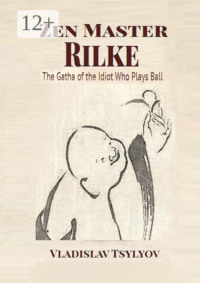Czytaj książkę: «Zen Master Rilke: The Gatha of the Idiot. Who Plays Ball»
Illustrator Vladislav Tsylyov
© Vladislav Tsylyov, 2025
© Vladislav Tsylyov, illustrations, 2025
ISBN 978-5-0060-4553-8
Created with Ridero smart publishing system
Preface
This book is my first work in the Buddha-Rilke series. The fantasy story it contains is small in volume, not overloaded with great meaning, and “brewed” like a single cup of unpretentiously light tea, so that it is not even read, but rather “digested” leisurely – in two or three carefree sips. And yet I hope that the aftertaste of such a “frivolous” book will remain with the reader for a long time.
The semantic centre of the book is “The Song of the Idiot”, one of Rilke’s paradoxical poems. I have to admit right away that my translation of this poem looks like a very free and clumsy interpretation of the original text. However, despite this shortcoming, I sincerely hope that I have managed to keep the spirit of Rilke’s Idiot alive and to integrate this character harmoniously into the story of the book.
To give the book a more expressive look, I decided to dilute the text with funny pictures – amusing Zen drawings by the acknowledged masters of this genre: Hakuin Ekaku (1686—1769), Sengai Gibon (1750—1837) and his friend Saito Shuho (c. 1768—1859).
I would like to point out that all images used in my illustrations are in the public domain.
Readers new to Zen vocabulary, as well as some textbook Zen characters and plots, will benefit from a small reference section at the end of the book. But first it is worth knowing what Gatha is. As Master Tho Idi once joked, “Gatha is an irrefutable demonstration of Emptiness in the mind of the idiot.”

Zen Poet Rilke
The Gatha of the Idiot Who Plays Ball
When asked about the sense of Tao, I will flutter like a Zhuang Tzu butterfly; when asked about the sense of Zen, I will open like a Basho flower; when asked about the sense of all sense, I will bounce like an idiot’s ball.
– Master Tho Idi*
The only result of Chan meditation, if the practice is serious, is idiocy.
– Leon Wieger**
You’re an idiot, I’m an idiot and so is God.
– George Gurdjieff***
* See the reference section of the book.
** Leon Wieger (1856 -1933) was a French Jesuit missionary, medical doctor, theologian and sinologist.
*** George Ivanovich Gurdjieff (1866 – 1949) was a philosopher, mystic, spiritual teacher, and composer.
Instead of Prologue
In the year 2022, in one of China’s most remote provinces, excavations at the ruins of an ancient Chan monastery have uncovered a strange script artefact. The archaeologists’ attention was drawn to a well-preserved manuscript which, according to a number of researchers, can be confidently dated to the eighth century. This documentary monument, written on a rare type of paper, contained the codex of a hitherto unknown school of sudden enlightenment called the Bouncing Ball School. Researchers have found many curiosities in this unique document. We know nothing about a mentor of this school, a master called Tho Idi, whose name does not appear in any historiographical source. Nor do we know how he came to be inspired by the texts of the great Japanese poet Basho (see epigraph), who lived and worked many years later – in the seventeenth (!) century. To top it all, the ancient oriental manuscript contains a poem by the famous European modernist poet R. M. Rilke, first published in 1906 (!).
The reader is presented with two key chapters of the Codex which convey the essence of Master Tho Idi’s teachings.

Hakuin Ekaku, Self-Portret
Darmowy fragment się skończył.
